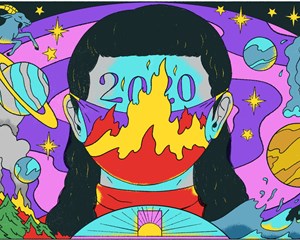Because face it: humans can often be terrible, making rash, selfish decisions at best and murdering one another at worst. Through most of 2020, to be locked inside and looking out was to feel peculiarly powerless. And even as we grew to feel more remote from the world as individuals, it also seemed that individual nations had begun to curl in on themselves, motivated by misguided notions of their own power and self-sufficiency. What does an "America first" agenda mean in a country that fails its own citizens when it comes to protecting them from a deadly virus? In the worst months of 2020, we were a nation that could barely take care of itself, let alone help anyone else through a crisis. Worse yet, we were on our way to becoming a nation that didn't want to help anyone else, even when it was in our own interest to do so. And democracy—not a badge you can earn, Scout-style, but a practice and a discipline that needs careful tending—came to seem wobbly and fragile even in places that have long professed to believe in it. As if it were a previously fashionable fad we'd all become tired of.
因為,面對現實吧:人類往往很可怕,最好的情況下他們會做出草率、自私的決定,最壞的情況下他們會互相殘殺。我們在2020年的大部分時間里都被關在屋里,看著外面,感覺特別無力。作為個人,感覺自己離世界越來越遠,似乎就連單個國家也開始蜷縮在自己的圈子里,被自己的力量和自給自足的錯誤觀念所驅使。對于一個在保護本國公民免受致命病毒侵害方面無能為力的國家來說,“美國優先”議程意味著什么?在2020年最糟糕的幾個月里,我們的國家連自己都顧不了,更不用說幫助別人度過危機了。更糟糕的是,我們正在成為一個不想幫助別人的國家,即使這樣做符合我們的自身利益。民主——不是童子軍式的徽章,而是一種需要小心呵護的實踐和紀律——民主在那些即便長期宣稱相信民主的地方也變得搖搖欲墜、不堪一擊,就好像民主是一種我們都已經厭倦了的過時了的時尚。

The pages on this strange calendar just kept turning, with the menace of the pandemic bleeding through all of it. Public figures who meant a great deal to us— Ruth Bader Ginsburg, John Lewis, Kobe Bryant, Chadwick Boseman—were wrested away. And in May, the killing of George Floyd at the hands of police in Minneapolis ignited righteous anger not just across the country but around the world. The ruthlessness of that act revived attention to similar outrages earlier in the year, particularly the killings of Breonna Taylor and Ahmaud Arbery. It also reminded us how often, throughout history, Black people had suffered similar injustices, with no recourse, no means of changing the status quo. And then in August, even with the whole world watching, police in Kenosha, Wis., shot and partially paralyzed another Black man, Jacob Blake, as three of his children watched from the backseat of his car.
這臺奇怪的日歷一頁一頁地翻著,到處都是病毒的威脅。那些對我們很重要的公眾人物——露絲·巴德·金斯伯格、約翰·劉易斯、科比·布萊恩特、查德威克·博斯曼——都在這一年去世了。今年5月,喬治·弗洛伊德在明尼阿波利斯市被警察槍殺,引發了全國乃至全世界正義的憤怒。這一殘忍行徑再次引起人們對今年早些時候類似暴行的關注,尤其是對布倫娜·泰勒和艾哈邁德·阿伯里的殺害。它還提醒我們,黑人在歷史上一直遭受類似的不公待遇而無力改變現狀。再之后是8月,即便全世界都在關注,威斯康星州基諾沙的警察還是朝另一名黑人男子開了槍并致其癱瘓,而他的三個孩子坐在車后座目睹了這一切。
The toxic traditions of injustice and inequality in America are no secret. A sequence of tragic events finally caused more white people to wake up. Whether this heightened awareness of the racism that has plagued our country since its founding translates into actual change remains to be seen. That's just one of many question marks waiting for us in 2021 and beyond. After a year of so many changes, will we change radically too?
不平等和不公正是美國的一種有毒的傳統,這已經不是什么秘密了。一系列的悲劇事件最終令更多的白人醒悟過來。這種對自建國以來一直困擾我國種族主義的高度認識能否轉化為實際的變化還有待觀察。這只是2021年及以后等待我們的眾多問題中的一個。一年多經歷了如此多的變化,我們也會徹底改變嗎?
譯文由可可原創,僅供學習交流使用,未經許可請勿轉載。











